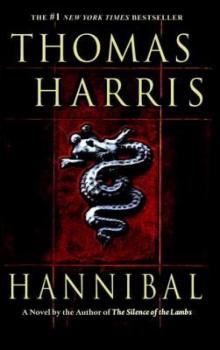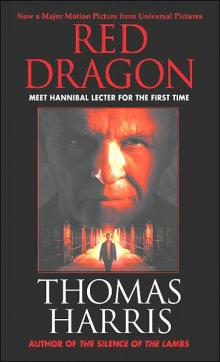- Home
- Thomas Harris
Hannibal Rising Page 21
Hannibal Rising Read online
Page 21
The words of her ancestor Murasaki Shikibu came to her and she said them:
“The troubled waters
Are frozen fast.
Under clear heaven
Moonlight and shadow
Ebb and flow.”
Hannibal made Prince Genji’s classic reply:
“The memories of long love
Gather like drifting snow.
Poignant as the mandarin ducks
Who float side by side in sleep.”
“No,” Lady Murasaki said. “No. Now there is only ice. It’s gone. Is it not gone?”
“You are my favorite person in the world,” he said, quite truthfully.
She inclined her head to him and left the room.
In Popil’s office she found Dr. Rufin and Dr. Dumas in close conversation. Rufin took Lady Murasaki’s hands.
“You told me he might freeze inside forever,” she said.
“Do you feel it?” Rufin said.
“I love him and I cannot find him,” Lady Murasaki said. “Can you?”
“I never could,” Rufin said.
She left without seeing Popil.
Hannibal volunteered to work in the jail dispensary and petitioned the court to allow him to return to medical school. Dr. Claire DeVrie, the head of the fledgling Police Forensics Laboratory a bright and attractive woman, found Hannibal extremely useful in setting up a compact qualitative analysis and toxin identification unit with the minimum of reagents and equipment. She wrote a letter on his behalf.
Dr. Dumas, whose relentless cheer irritated Popil beyond measure, submitted a ringing endorsement of Hannibal, and explained that Johns Hopkins Medical Center in Baltimore, America, was offering him an internship, after reviewing his illustrations for the new anatomy text. Dumas addressed the morals clause in no uncertain terms.
In three weeks’ time, over the objections of Inspector Popil, Hannibal walked out of the Palace of Justice and returned to his room above the medical school. Popil did not say goodbye to him, a guard simply brought him his clothes.
He slept very well in his room. In the morning he called the Place de Vosges and found Lady Murasaki’s telephone had been disconnected. He went there and let himself in with his key. The apartment was empty except for the telephone stand. Beside the telephone was a letter for him. It was attached to the blackened twig from Hiroshima sent to Lady Murasaki by her father.
The letter said Goodbye, Hannibal. I have gone home.
He tossed the burnt twig into the Seine on his way to dinner. At the Restaurant Champs de Mars he had a splendid jugged hare on the money Louis left to buy Masses for his soul. Warmed with wine, he decided that in strict fairness he should read some prayers in Latin for Louis and perhaps sing one to a popular tune, reasoning that his own prayers would be no less efficacious than those he could buy at St.-Sulpice.
He dined alone and he was not lonely.
Hannibal had entered his heart’s long winter. He slept soundly and was not visited in dreams as humans are.
III
I’d yield me to the Devil instantly, Did it not happen that myself am he!
—J. W. VON GOETHE: Faust: A Tragedy
58
IT SEEMED TO SVENKA that Dortlich’s father was never going to die. The old man breathed and breathed, two years of breathing while the coffin draped with a tarpaulin waited on sawhorses in Svenka’s cramped apartment. It took up most of the parlor. This occasioned a lot of griping by the woman living with Svenka, who pointed out that the coffin’s rounded top prevented its use even as a sideboard. After a few months she began to keep in the coffin contraband canned goods Svenka extorted from people returning from Helsinki on the ferries.
In the two years of Joseph Stalin’s murderous purges, three of Svenka’s fellow officers were shot and a fourth was hanged in Lubyanka Prison.
Svenka could see that it was time to go. The art was his and he was not leaving it. Svenka did not inherit all of Dortlich’s contacts, but he could get good papers. He did not have contacts inside Sweden, but he had plenty on the boats between Riga and Sweden who could deal with a package once it was at sea.
First things first.
On Sunday morning at six forty-five a.m., the maid Bergid emerged from the Vilnius apartment building where Dortlich’s father lived. She was bareheaded to avoid the appearance of going to church, and carried a sizable pocketbook with her scarf and her Bible in it.
She had been gone about ten minutes when, from his bed, Dortlich’s father heard the footsteps of a person heavier than Bergid coming up the stairs. A clicking and a rasping came from the apartment door as someone raked the tumblers of the lock.
With an effort, Dortlich’s father pushed himself up on his pillows.
The outside door dragged on the threshold as it was pushed open. He fumbled in the drawer beside his bed and took out a Luger pistol. Faint with the effort, he held the gun in both hands and brought it under the sheet.
He closed his eyes until the door of his room opened.
“Are you sleeping, Herr Dortlich? I hope I’m not disturbing you,” said Sergeant Svenka, in civilian clothes with his hair slicked down.
“Oh, it’s you.” The old man’s expression was as fierce as usual, but he looked gratifyingly weak.
“I came on behalf of the Police and Customs Brotherhood,” Svenka said. “We were cleaning out a locker and we found some more of your son’s things.”
“I don’t want them. Keep them,” the old man said. “Did you break the lock?”
“When no one came to the door I let myself in. I thought I’d just leave the box if no one was home. I have your son’s key.”
“He never had a key.”
“It’s his skeleton key.”
“Then you can lock the door on your way out.”
“Lieutenant Dortlich confided to me some details about your … situation and your eventual wishes. Have you written them down? You have the documents? The brotherhood feels it’s our responsibility now to see your desires carried out to the letter.”
“Yes,” Dortlich’s father said. “Signed and witnessed. A copy sent to the Klaipeda. You won’t need to do anything.”
“Yes, I do. One thing.” Sergeant Svenka put down the box.
Smiling as he approached the bed, he picked up a cushion off a chair, scuttling sideways spiderlike to put it over the old man’s face, climbing astride him on the bed, knees on his shoulders, and leaned with his elbows locked, his weight on the cushion. How long would it take? The old man was not thrashing.
Svenka felt something hard pressing in his crotch, the sheet tented under him and the Luger went off. Svenka felt the burn on his skin and the burn deep up inside him and fell away backward, the old man raising the gun and shooting through the sheet, hitting him in the chest and chin, the muzzle drooping, and the last shot hit his own foot. The old man’s heart beat faster and faster faster stop. The clock above his bed struck seven, and he heard the first four strokes.
59
SNOW ABOVE THE 50th Parallel dusting the high forehead of the hemisphere, Eastern Canada, Iceland, Scotland, and Scandinavia. Snow in flurries in Grisslehamn, Sweden, snow falling into the sea as the ferry carrying the coffin came in.
The ferry agent provided a four-wheeled trolley to the men from the funeral home and helped them load the coffin on it, getting up a little speed on the deck to bump up the ramp onto the dock where the truck waited.
Dortlich’s father died without immediate family and his wishes were clearly expressed. The Klaipeda Ocean and River Workers Association saw to it his wishes were carried out.
The small procession to the cemetery consisted of the hearse, a van with six men from the funeral home, and a car carrying two elderly relatives.
It is not that Dortlich’s father was entirely forgotten, but most of his childhood friends were dead and few relatives survived. He was a maverick middle son, and his enthusiasm for the October Revolution estranged him from his family, and took him
to Russia. The son of shipbuilders spent his life as an ordinary seaman. Ironic, agreed the two old relatives riding behind the hearse through the falling snow in the late afternoon.
The Dortlich family mausoleum was grey granite with a cross incised above the door and a tasteful amount of stained glass in clerestory windows, just colored panes, not figurative.
The cemetery warden, a conscientious man, had swept the path to the mausoleum door and swept the steps. The great iron key was cold through his mittens and he used both hands to turn it, the tumblers squealing in the lock. The men from the funeral home opened the big double doors and carried the coffin in. There was some muttering from the relatives about the Communist labor union emblem on the lid being displayed in the mausoleum.
“Think of it as a brotherly farewell from those who knew him best,” the funeral director said, and coughed against his glove. It was an expensive-looking coffin for a Communist, he reflected, and speculated about the markup.
The warden had in his pocket a tube of white lithium grease. He made paths on the stone for the feet of the coffin to slide on as it went sideways into its niche, and the pallbearers were glad when they had to slide it into place, pushing from only one side and unable to lift.
The party looked around among themselves. No one volunteered to pray and so they locked the building and hurried back to their vehicles in the blowing snow.
Upon his bed of art Dortlich’s father lies still and small, ice forming in his heart.
The seasons will come and go. Voices come in faintly from the gravel paths outside, and occasionally the tendril of a vine. The colors of the stained glass grow softer as the dust accumulates. The leaves blow and then the snow, and around again. The paintings, their faces so familiar to Hannibal Lecter, are rolled up in the dark like the coils of memory.
60
GREAT SOFT FLAKES fall in still morning air along the Lievre River, Quebec, and lie feathery on the sills of the Caribou Corner Outdoor and Taxidermy shop.
Big flakes like feathers fall in Hannibal Lecter’s hair as he hikes up the wooded lane to the log building. It is open for business. He can hear “O Canada!” coming from a radio in the back as a high school hockey game is about to begin. Trophy heads cover the walls. A moose is at the top and arranged in Sistine fashion below it are tableaus of Arctic fox and ptarmigan, soft-eyed deer, lynx and bobcat.
On the counter is a partitioned tray of taxidermy eyes. Hannibal sets down his bag and pokes through the eyes with a finger. He finds a pair of the palest blue intended for a dear and deceased husky. Hannibal takes them out of the tray and places them side by side on the countertop.
The proprietor is coming out. Bronys Grentz’s beard is grizzled now, his temples are greying.
“Yah? I can help you?”
Hannibal looks at him, pokes in the tray and finds a pair of eyes that match Grentz’s bright brown eyes.
“What is it?” Grentz asks.
“I’ve come to collect a head,” Hannibal said.
“Which one, have you got your ticket?”
“I don’t see it up there on the wall.”
“It’s probably in the back.”
Hannibal has a suggestion. “May I come? I’ll show you which one.”
Hannibal brings his bag with him. It contains a few clothes, a cleaver and a rubber apron marked Property of Johns Hopkins.
It was interesting to compare Grentz’s mail and his address book to the roster of the wanted Totenkopfs circulated by the British after the war. Grentz had a number of correspondents in Canada and Paraguay and several in the United States. Hannibal examined the documents at his leisure on the train, where he enjoyed a private compartment, courtesy of Grentz’s cash box.
On the way back to his internship in Baltimore, he broke his trip in Montreal, where he mailed Grentz’s head to one of the taxidermist’s pen pals and put as a return address the name and address of another.
He was not torn with anger at Grentz. He was not torn at all by anger anymore, or tortured by dreams. This was a holiday and killing Grentz was preferable to skiing.
The train rocking southward toward America, so warm and well sprung. So different from his long train trip to Lithuania as a boy.
He would stop in New York overnight, stay at the Carlyle as the guest of Grentz, and see a play. He had tickets for both Dial M for Murder and Picnic. He decided to see Picnic as he found stage murders unconvincing.
America fascinated him. Such abundant heat and electricity. Such odd, wide cars. American faces, open but not innocent, readable. In time he would use his access as a patron of the arts to stand backstage and look out at audiences, their rapt faces glowing in the stage lights, and read and read and read.
Darkness fell and the waiter in the dining car brought a candle to his table, the blood-red claret shivering slightly in his glass with the movement of the train. Once in the night he woke at a station to hear the railroad workers blasting ice off the undercarriage with a steam hose, great clouds of steam sweeping past his window on the wind. The train started again with a tiny jerk and then a liquid glide away from the station lights and into the night, stroking southward toward America. His window cleared and he could see the stars.
ACKNOWLEDGMENTS
My thanks to the Brigade Criminelle of the Paris police, who welcomed me into the world of the Quai des Orfèvres and shared with me both their harrowing knowledge and their excellent lunch.
Lady Murasaki is the namesake of Murasaki Shikibu, who wrote the first great novel in the world, The Tale of Genji. Our own Lady Murasaki quotes Ono no Komachi and hears in her mind a poem by Yosano Akiko. Her farewell to Hannibal is from The Tale of Genji. Noriko Miyamoto helped me greatly with literature and music.
As you see, I have borrowed S. T. Coleridge’s dog.
For a better understanding of France during the occupation and in the post-war period, I am indebted to Robert Gildea’s Marianne in Chains, to Antony Beevor and Artemis Cooper’s Paris After the Liberation, 1944–1949, and to The Rape of Europa by Lynn H. Nicholas. Susan Mary Alsop’s remarkable letters to Marietta Tree, collected in To Marietta from Paris, 1945–1960, were helpful as well.
Most of all, my thanks to Pace Barnes for her unfailing support, and her love and her patience.
—T.H.
ABOUT THE AUTHOR
Thomas Harris began his writing career covering crime in the United States and Mexico, and was a reporter and editor for the Associated Press in New York City. His first novel, Black Sunday, was published in 1975, followed by Red Dragon in 1981, The Silence of the Lambs in 1988, and Hannibal in 1999.
HANNIBAL RISING
A Dell Book
Published by Bantam Dell
A Division of Random House, Inc.
New York, New York
This is a work of fiction. Names, characters, places, and incidents either are the product of the author’s imagination or are used fictitiously. Any resemblance to actual persons, living or dead, events, or locales is entirely coincidental.
Grateful acknowledgment is made to the following for permission to reprint previously published material:
Farrar, Straus and Giroux, LLC, and Faber and Faber Limited: “This is the first thing” from Collected Poems by Philip Larkin, copyright © 1988, 2003 by the Estate of Philip Larkin. Rights outside the United States administered by Faber and Faber Limited, London.
Vintage Books: “No way to see him” from The Ink Dark Moon: Love Poems by Ono no Komachi and Izumi Shikibu, translated by Jane Hirshfield and Mariko Aratani, copyright © 1990 by Jane Hirshfield.
The Estate of Lawrence P. Spingarn: Excerpt from “Definition” from Rococo Summer and Other Poems by Lawrence P. Spingarn, copyright © 1947 by E. P. Dutton & Co., Inc.
New Directions Publishing Corp.: “From The Tale of Genji” by Murasaki Shikibu from Women Poets of Japan, translated by Kenneth Rexroth and Ikuko Atsumi, copyright © 1973 by Kenneth Rexroth and Ikuko Atsumi; “Amidst the notes …”by Akiko Yosa
no from One Hundred More Poems from the Japanese, translated by Kenneth Rexroth, copyright © 1976 by Kenneth Rexroth.
All rights reserved
Copyright © 2006 by Yazoo Fabrications, Inc.
Dell is a registered trademark of Random House, Inc., and the colophon is a
trademark of Random House, Inc.
eISBN: 978-0-440-33925-0
v3.0

 The Silence of the Lambs
The Silence of the Lambs Red Dragon
Red Dragon Hannibal
Hannibal Black Sunday
Black Sunday Cari Mora
Cari Mora Hannibal Rising
Hannibal Rising Red Dragon hl-1
Red Dragon hl-1 The Silence of the Lambs (Hannibal Lecter)
The Silence of the Lambs (Hannibal Lecter)